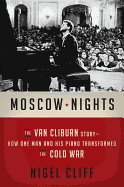
In Moscow Nights: The Van Cliburn Story--How One Man and His Piano Transformed the Cold War, historian Nigel Cliff (The Last Crusade) brings to life Van Cliburn's unexpected triumph and its continuing implications for Soviet-American relations through the end of the Cold War. Cliff sets the story of the competition firmly in the historical context of Sputnik, political paranoia on both sides of the Iron Curtain, and both Soviet and American use of culture as a diplomatic weapon. At the same time, he never loses sight of the musician and the music: Cliff's Van Cliburn is eccentric, driven, politically innocent, big-hearted and wholly charming.
Moscow Nights is an engaging account of an extraordinary historical moment, best read with Van Cliburn's recording of Tchaikovsky's Piano Concerto No. 1 playing in the background. --Pamela Toler, blogging at History in the Margins

